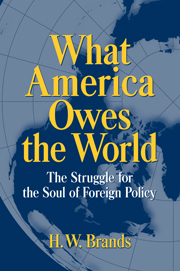Book contents
- Frontmatter
- Contents
- Preface
- 1 Exceptionalists All! The First Hundred Years
- 2 Brooks Adams: Marx for Imperialists
- 3 Walter Lippmann and a New Republic for a New Era
- 4 When the Future Worked and the Trains Ran on Time: Lincoln Steffens
- 5 Dr. Beard's Garden
- 6 Kennan, Morgenthau, and the Sources of Superpower Conduct
- 7 Reinhold Niebuhr and the Foreign Policy of Original Sin
- 8 God Blinked but Herman Didn't
- 9 On Wisconsin: Madison and Points Left
- 10 The Brief of Norman's Woe: Commentary and the New Conservatism
- 11 It Ain't Over till It's Over – and Not Even Then
- Note on Sources
- Index
10 - The Brief of Norman's Woe: Commentary and the New Conservatism
Published online by Cambridge University Press: 25 March 2010
- Frontmatter
- Contents
- Preface
- 1 Exceptionalists All! The First Hundred Years
- 2 Brooks Adams: Marx for Imperialists
- 3 Walter Lippmann and a New Republic for a New Era
- 4 When the Future Worked and the Trains Ran on Time: Lincoln Steffens
- 5 Dr. Beard's Garden
- 6 Kennan, Morgenthau, and the Sources of Superpower Conduct
- 7 Reinhold Niebuhr and the Foreign Policy of Original Sin
- 8 God Blinked but Herman Didn't
- 9 On Wisconsin: Madison and Points Left
- 10 The Brief of Norman's Woe: Commentary and the New Conservatism
- 11 It Ain't Over till It's Over – and Not Even Then
- Note on Sources
- Index
Summary
In appealing to a changeless human nature, Tucker identified a basic division between the radicalism of the 1960s and early 1970s and the conservatism that characterized the decade that followed (and for that matter between radicalism and conservatism generally). The radicals believed that American society could be changed significantly for the better, by enlightened individual action, in the view of Williams and the near left, or by institutional restructuring, in the opinion of Kolko and the distant left. Conservatives like Tucker had no such faith. They perceived the tragedy of American diplomacy, and of human affairs overall, as originating in the intrinsically flawed character of individuals. Until human nature changed, as it hadn't done during the several millennia people had been keeping track, wisdom resided in making the modest best of a bad situation, which usually meant leaving things alone.
Conservatism has always flourished in the wake of reforms run awry. The 1970s fit the pattern, although not immediately. Lyndon Johnson's Great Society uncovered as many problems as it solved, raising expectations among the dispossessed and their sponsors that would have proved impossible to meet even had the War on Poverty and on other forms of inequality always been fought with exemplary skill and bravery, which it wasn't. The series of leaps in oil prices that began with the 1973 round of Middle East fighting exacerbated inflationary pressures originating in Johnson's double-dipping of dollars to fund both domestic programs and the war in Vietnam while holding taxes down.
- Type
- Chapter
- Information
- What America Owes the WorldThe Struggle for the Soul of Foreign Policy, pp. 263 - 296Publisher: Cambridge University PressPrint publication year: 1998



